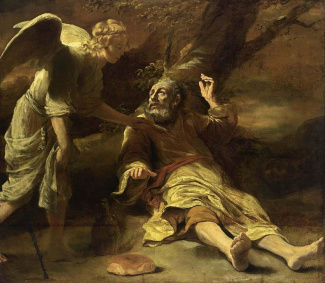During their life both Elijah and Elisha were prophets called by God. Elijah's name means "God the Lord, the strong Lord" and Elisha's means "salvation of God." If you are questioning a blood relationship between them, there is none. Except for a mention in 1Kings 17:1, we know nothing of their parentage or early life. We do know that the latter was a native of Abel-Meholah in the northern kingdom of Israel.
Elijah prophesied during the reigns of Israelite kings Ahab, Ahaziah and Joram. Elisha took over during Joram's reign, and prophesied through the reigns of Jehu, Jehoahaz and Jehoash.
Character
Elijah was a man of few words. His style (unlike that of Elisha) was to pronounce his message then quickly leave (2Kings 1:4). Kings both knew and feared him. When King Ahaziah asked his messengers who had given the message that he would die, they said it was a man who wore a leather belt (2Kings 1:8). The king then gave a troubled response.
And he said to them, "What kind of man was he who came up to meet you and told you these words?" And they answered him, "He was a hairy man and was bound with a girdle of leather around his loins." And he said, "He is Elijah the Tishbite." (2Kings 1:7 - 8).

This prophet led what we might call today a "dynamic life." He was a prophet who warned and punished the Kings of Israel for their sins. He also raised a widow's son from the dead (1Kings 17:2 - 24).
Elijah also had a major confrontation with Israel's false prophets on Mount Carmel, which ended in the execution of 850 prophets of Baal and Asherah (1Kings 18:18 - 40). God even gave him the power to OUTRUN the chariot of Ahab (who also had a head start) to the entrance of Jezreel (1Kings 18:46)!
God commands Elijah, after fleeing death threats from Queen Jezebel, to anoint two kings and make Elisha his successor (1Kings 19). He is taken, after completing these tasks, away from the area on a miraculous fiery chariot sent by God. Elisha's request for a double portion of God's spirit is granted.
And it came to pass when they had gone over, Elijah said to Elisha, "Ask what I shall do for you before I am taken away from you." And Elisha said, "Please, let a double portion of your Spirit be upon me."
And he said, "You have asked a hard thing, but if you see me taken from you, it shall be so to you; but if not, it shall not be."
Then it came to pass as they went on and talked, behold, a chariot of fire and horses of fire came, and they separated between them both. And Elijah went up in a tempest into heaven (2Kings 2:9 - 11).
The service to God of Elijah was so exemplary that he represented all the Old Testament prophets when Jesus was transfigured and in a vision is seen talking to him and Moses (Luke 9:28 - 36). John the Baptist, who prepared the way for Jesus before his ministry began, preached in his spirit and power (John 1:19 - 23, Matthew 17:10 - 13).
The Life of Elisha
Elisha, on the other hand, was a humble farmer (1Kings 19:16 - 19). He apparently knew what it meant when his mentor's mantle was cast over him, since when it occurred he simply said goodbye to his parents (verses 20 - 21). He then followed Elijah until the day God took him away by a chariot of fire.
Elijah was rough shod and hairy and thundered his denunciation of kings. His successor, however, stayed as a visitor in the homes where he went. He dressed like the people of his day and generally succored the people.
Elisha, after sixty years of service as a prophet, died in his own home (2Kings 13:14, 20). God's power, however, showed through him even after his death. One day, some men were burying a man in a cave when a gang appeared and caused them to flee. The place where the body was left unburied was also the place where Elisha was laid to rest. When the bodies touched each other, the dead man thrown into the cave was miraculously brought back to life!
Then Elisha died, and they buried him. And the bands of the Moabites invaded the land at the first of the year.
Now it came to pass as they were burying a man, behold, they spied a band of men. And they threw the man into the grave of Elisha. And the man went down and touched the bones of Elisha, and he revived and stood up on his feet (2Kings 13:20 - 21).